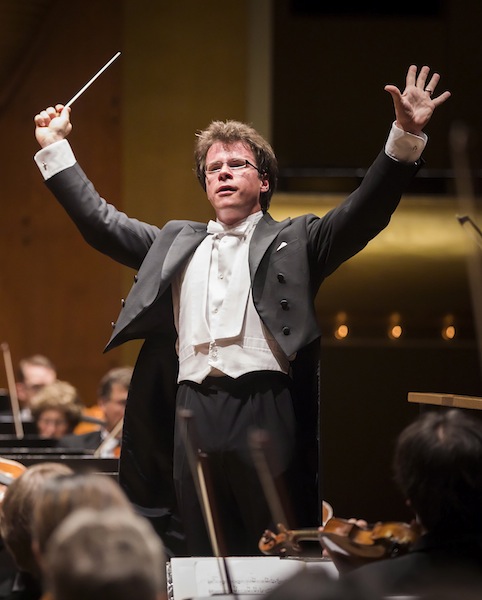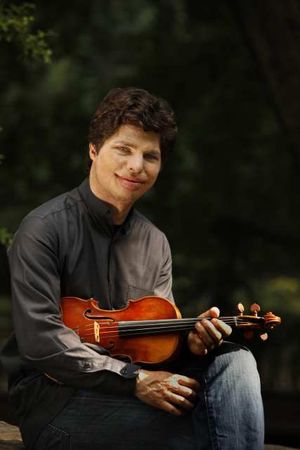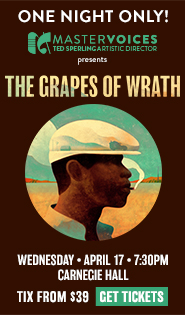Hrůša’s native Czech music shines brightly in Philharmonic debut

Conductor Jakub Hrůša made his New York Philharmonic debut in an all-Czech program Thursday night at David Geffen Hall. Photo: Chris Lee
How often do we read the phrase “the concerto sounded under-rehearsed” in a review? The lion’s share of rehearsal time, it seems, is so often lavished on the symphonic works on concert programs that to talk about an ill-prepped concerto has become almost tautological.
Dvořák’s Violin Concerto, which made up the first half of Thursday’s New York Philharmonic concert, is on the rough side to begin with. In the right hands it can be a compelling work, but on its own terms it doesn’t quite match up with its siblings in terms of either virtuosity or expressive potential.

Augustin Hadelich
Augustin Hadelich certainly gave it his best in Thursday’s performance—he’s got the sun-kissed golden-age-of-recording tone that gives any romantic concerto an insistent, singing beauty. He perfectly captured the spirit of the piece, from the earnest sighs of the Adagio to the bouncing celebration of the Finale.
So it was all the more unfortunate that the Philharmonic, under the baton of Jakub Hrůša, was barely present. Their opening bars, which ought to announce the arrival of the solo part with authority, were an ill-tuned jumble, and aside from Grace Shryock’s lovely english horn solos, most of the playing thereafter was unconvincing and fuzzy in articulation. Hadelich tried his best to move the rigid tempo along in the first movement, but no flexibility was forthcoming.
Still, his own brilliance was enough to earn him a nice hand, and he rewarded the audience with Paganini’s Caprice No. 1. Paganini encores are something of a shtick for Hadelich, but one he pulls off well—the caprice was crisply played and impressively clean, even if the piece doesn’t offer much potential for performer’s persoanlity to come through.
The Philharmonic musicians, for their part, seemed to save everything for after intermission. The three Slavonic Dances by Dvořák that opened the second half were superb. Immediately apparent in Op. 46, No. 1 were all the energy and focus that had been missing, creating a bright rush of sound, cheery bombast softened with grace. The music lost some of that direction in Op. 2, No. 2, but under Hrůša’s direction showed flair and maintained a playful freedom. The third, Op. 72, No. 7, was a splendid romp, absolutely tight but not letting precision get in the way of the joyous, folkish stomp of the music.
Finer still was Taras Bulba. Janáček’s three-part Rhapsody for Orchestra is based on the Gogol novella of the Ukrainian folk hero’s tragic experience of war.
Hrůša, in his Philharmonic debut, led a fabulously vivid reading of the piece, perfectly balanced, so that the crucial elements came to the fore. The gorgeous, airy textures of Part I, “The Death of Andri,” magnified the eventual tragedy heard in the ferocity of battle. Concertmaster Frank Huang’s solos were lovingly played throughout the entire cycle, becoming a character all to themselves.
The Philharmonic strings have rarely sounded as warm as in “The Death of Ostap,” Part II of the cycle–another crystal-clear reading of a tragic episode, evocatively rendered. The final part, “The Prophecy and the Death of Taras Bulba,” showed deep pathos, as we heard a soaring vision of hope among the turmoil of the title character’s final moments.
The program will be repeated 2 p.m. Friday and 8 p.m. Saturday at David Geffen Hall. nyphil.org


